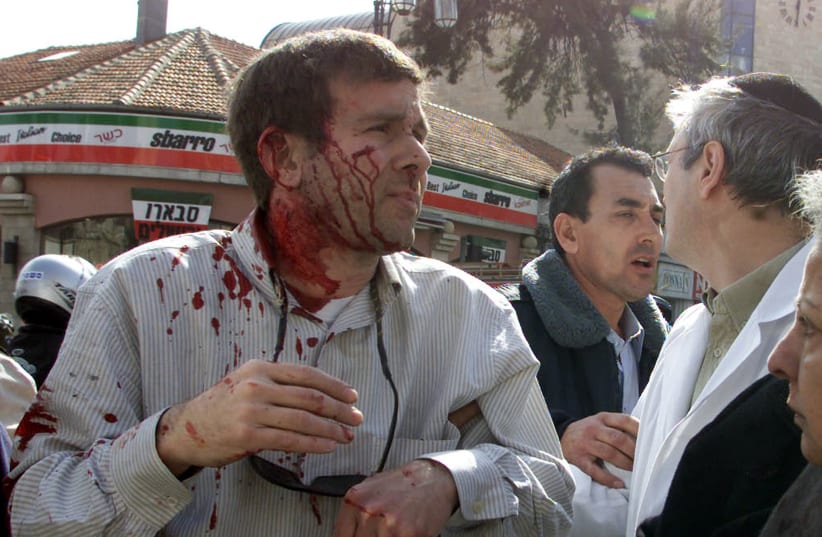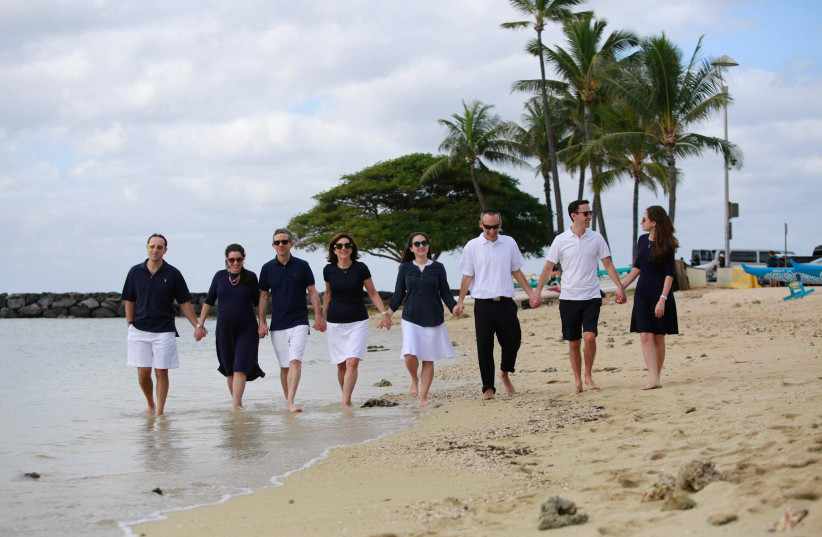My cousin Mark Sokolow, his wife, Rena, and their children and grandchildren will be together in their family home in Woodmere, Long Island, celebrating Thanksgiving this weekend.
No, not the usual American Thanksgiving – they did that two months ago.
They mark the date January 27, 2002. 14 Shevat 5762.
Twenty years ago next week they survived a terror attack in Jerusalem.
Their close encounter with terror actually started earlier, and closer to home. On September 11, 2001. Mark was in his law office on the 38th floor of the South Tower of the World Trade Center when the first plane struck the North Tower. With good instincts, he began walking down the emergency stairs. He didn’t hear the all-clear announcement and so did not return to his desk.
At 9:03 a.m., when United Airlines Flight 175 crashed into the South Tower, Mark was already on the concourse level, leaving his car in the parking lot two blocks away. When Rena called in a panic, he was on his way home. On the Long Island Railroad, he saw the smoke go up from the place he'd spent his workdays.
As Mark, Rena and their daughters gave thanks for Mark’s escape, they mourned the 2,977 people who were murdered, and prayed for the more than 6,000 others injured. Grateful to be alive, Mark suggested a family trip to Israel.
So in mid-January, Mark, Rena, daughters Lauren, 16, and Jamie, 12, the bat mitzvah girl, arrive in Israel. Elana, 18, the oldest of their three daughters, is already studying at a Jerusalem religious seminary. My husband and I are delighted, of course. With the terror attacks of the Second Intifada, family visits from abroad are few, and we particularly want to hear about Mark’s experience.
They spend 10 glorious days touring including Eilat. On the last day of their visit the teens want to go to downtown Jerusalem to buy sandals.
“Is it safe?” Mark asks me.
Little do I know how that question will haunt me. I don’t mention that downtown Jerusalem is sometimes called “Ground Zero,” because of the many terrorist attacks there.
I tell them that I’m downtown every weekday at the Hadassah organization offices, at the corner of Rabbi Kook Street and Jaffa Road. Across the street is the legendary Khalifa shoe store with its endless inventory. Familiar with the long deliberations on shoe purchasing from my own daughters, I ask Mark to phone after they have finished shopping. Maybe we can do lunch. I’ll also deliver a Holocaust manuscript I’ve edited for Mark’s stepmother, who was saved in Berlin by a righteous gentile named Maria.
When he calls, they’re just outside a different shoe store, Freiman and Bein, on Jaffa Road, corner of King George Street. “I’ll be there in two minutes,” I promise. I pick up my cellphone and the manuscript. I skip down the stairs, out the building, cutting through the back alley linking Rabbi Kook Street with Jaffa Road. I’m thinking about what a magnificent blue sky, sunny winter day it is, when there’s an ear-piercing boom followed by a sickening black cloud rising from the area of the shoe shop.
I will eventually learn that Wafa Idris, a young woman volunteer with the Red Crescent, walked into the second shoe store and tried on shoes. As Mark, Rena and the girls left the shop with their sandals, so did she. Idris hit the button on her 10 kg. bomb, injuring 150 persons and murdering Pinhas Tokatli, 81, a fifth-generation Jerusalemite on his way home from a painting lesson. According to the police, Tokatli was standing very close to Idris. He reportedly died a short distance from where on Jaffa Road, in the 1940s, British soldiers beat him, damaging his vision.
I run forward, searching, hoping to find my cousins, but the street is already blocked off by the police in case there is a secondary explosion. Cellphone circuits are down. I see a woman covered in dust at a bus stop and help her to an ambulance.
I wonder if the pressure in my lungs is from the bomb’s concussive waves or just anxiety.
I find Mark in the Bikur Cholim Hospital down the street. His face is bloodied with wounds. I shout to him. He looks up. We embrace. Twenty years later I can still feel the power of that hug.
Jamie is there, too, I hardly recognize her. It isn’t just the cuts and burns and bruises or her bulging right eye that makes her look different. She’s gray and unnaturally quiet. Rena and Lauren are missing. The wait is agonizing until we learn they have both survived. Lauren is lightly injured, but Rena will need surgery for a shattered leg. Fortunately, studious Elana (today a physician) hasn’t gone shopping because she didn’t want to leave class.
I ride with Jamie in the ambulance to Hadassah-University Medical Center Ein Kerem’s eye department. We pass by Yad Vashem, where we have recently visited Maria’s tree, and I wonder when we’ll be able to live in peace.
When we get to the emergency ward, the ophthalmologist, an Arab woman physician succeeds in saving Jamie’s eye.
The New York Post runs a cover with Mark’s photo calling him “Mr. Lucky” because he’s survived two terror attacks.
But Mark doesn’t rely on luck. He becomes the lead plaintiff for 11 families in the court cases against the PLO/Palestinian Authority and is also a plaintiff in cases against US-located banks. The family of Wafa Idris received a payment of more than $5,000 from the Arab Bank, Mark shows. A jury unanimously finds the PLO and the Palestinian Authority liable, but the Second Circuit Court of Appeals vacates the verdict, which is still being appealed..
The first years after the attack, Mark and Rena come to Jaffa Road to recite the prayer thanking God “causing a miracle in this place.” This year, because of the coronavirus travel restrictions, they are gathering around their own Shabbat table with their blessedly growing family of children and grandchildren.
Theirs is a home overflowing with gratefulness and joy. Mark has scheduled a siyum, the end of a study cycle, to share with the family. Now that the skies have reopened, they’ll be back in Jerusalem.
“I’ll be there in two minutes,” I told Mark. I retrace my footsteps from my office to the site of the bombing. Ninety-two seconds. Add 30 seconds to gather my things. Just recently I find myself waking in the middle of the night counting those seconds and counting my blessings.
The writer is the Israel director of public relations at Hadassah, the Woment’s Zionist Organization of America. Her latest book is A Daughter of Many Mothers.

